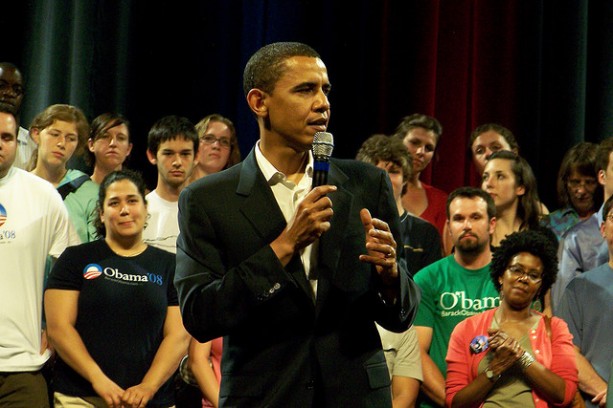
The election of Barack Obama, while a milestone in race relations, also set off extensive debate over racial identity and politics in the United States. On Thursday, September 8th, Harvard law professor Randall Kennedy visited Zócalo to discuss how race continues to shape American politics and the presidency of Barack Obama. The following is an excerpt (cuts marked with ellipses) of the introduction to Kennedy’s latest book, The Persistence of the Color Line: Racial Politics and the Obama Presidency:

On November 5, 2008 America seemed to have taken a giant stride toward racial redemption. We had elected Barack Hussein Obama to be President of the United States. People who had, in emotional self-defense, habitually refused to invest in patriotism now did so openly and enthusiastically. People who had doubted that Americans would ever be able to overcome racial alienation now expressed a belief that they could. Strangers danced and cried with one another…
Recalling that joyful moment now is painful. Despite prophecies and prayers that Obama’s election would point the way towards better race relations, his presidency and reactions to it have revealed the haunting persistence of the color line. … While Obama’s most loyal and fervent followers are African Americans, black conservatives and black leftists are also among his most vitriolic detractors. As for Obama’s outreach to non-blacks, the fact that he has had to work very hard, and often in vain, to make himself and his family acceptable to white Americans…
Surprisingly, when we look back at the election season of 2008, what was most notable about it wasn’t how much racial demagoguery there was but how little. John McCain, to his credit, refused to pull out the racial stops at his disposal in his fight with Obama. … Still, as soon as he emerged as a serious contender for the presidency, Obama had to contend with racially inflected insinuations questioning his patriotism…
To fend off such doubts, Obama has been at pains to underscore his patriotism whenever possible. He repeats time-worn versions of the American national narrative – celebratory stories that venerate the Founding Fathers (despite their slaveholding), laud the pioneers who “won” the West (despite their participation in the ethnic cleansing of Native Americans), and applaud America’s soldiers (despite their participation, often as draftees, in imperialistic or otherwise misguided ventures). Like his predecessors, Obama sends flowers to commemorate the Confederate war dead…
What no public officeholder can escape, though, is that Americans are deeply confused and conflicted regarding racial strategies and goals. Some Americans want “color blindness” now. Others seek color blindness but believe that we must first remove obstacles stemming from past and present racial wrongdoing. Still others reject color blindness as strategy or goal at all, insisting on deference to the boundaries that distinguish groups.
Despite his assertion that “race is an issue… this nation cannot afford to ignore,” Obama provides little in the way of clarification on this front. He is loath, at least in public, to expatiate seriously upon racial matters. He prefers offering formulaic fare that friendly audiences can be counted on to adore…
This also means that Obama avoids racial controversy on the policy front. He does not expend political capital vocally defending affirmative action. He refuses to conceptualize “minority unemployment” as a discrete issue warranting special treatment. And he has been done little, or anything, to take a strong stand against the mass incarceration of African Americans…
I am not blaming Obama – at least not mainly. The problem stems from a deeply flawed Constitution, an appallingly ignorant populace, and a political culture that perpetuates inertia, distraction and false consciousness. Some American rallied to Obama hoping that he would be a transformational leader. Confronted with these deeper problems, however, Obama has turned out to be stolidly conventional…
Certainly, I don’t want Obama to be a political martyr. I want him be prudent for his own sake and for the sake of his policies, decisions, and appointments… Certainly, I am mindful that there is much that I do not know – that no observer can know – about the retail, nitty-gritty politics with which a president must grapple…
But I also consider Obama to be excessively cautious in advancing progressive policies and values. He appreciates too little that a political leader can win in the long run by pushing a position (or an appointment) that loses in the short run… And he has been almost fanatical in his search for safe moderation, especially regarding marginalized groups. To gays and lesbians, for instance, he has offered noble rhetoric, followed by equivocation, followed by promises, followed by qualifications, followed by delays, followed by explanations, followed by appeals for more patience. Obama should revisit the period when John Lewis and others rightly demanded that JFK and LBJ say and do more on behalf of African Americans who were being cruelly wronged.
Aware of all these thoughts, I’m yet unembarrassed to say that I admire Barack Obama. For him to have perceived his chance, overtaken Hillary Clinton, vanquished John McCain, convinced a center-right country to elect a black liberal, and gotten important legislation passed – for him to have done all of that and more is astonishing. To prevail he has had to be realistic. I just wish, on the dangerous but inescapable questions of race in America, he were more, well, audacious.
Buy the book: Skylight Books, Powell’s, Amazon
*Photo courtesy of Allison Harger.




Send A Letter To the Editors